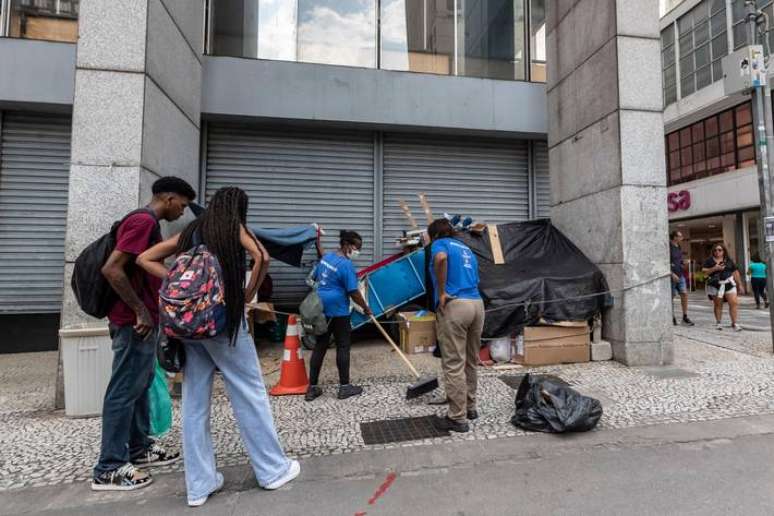In February, the deputy Guilherme Boulos and the priest Júlio Lancellotti managed to suspend the clearance work of the town hall through a popular action
The court overturned the injunction barring the City from doing so St. Paul remove tents for the homeless in public areas of the capital. The decision was signed by Judge Ribeiro de Paula last Friday, 31. The measure allows the government to resume actions to remove objects that serve as homes for those who live on the streets of the city.
Municipal clearing works they have been banned since February, by order of Judge Juliana Molina, of the 7th Public Treasury Tribunal. The magistrate complied with a popular action promoted by the deputy Guilherme Boulos (PSOL-SP) and from Father Giulio Lancellotti and determined the suspension of the evacuation of the tents. Now, with the new decision of the Justice, the municipal administration has communicated that the Subprefecture Sé will bring together the teams to start the actions for the city center.
The Municipality justifies the removal of the tents on the basis of a 2020 decree, which does not allow permanent occupations in public places that hinder the free movement of pedestrians and vehicles. Objects such as beds and sofas must also be removed, according to the municipality, as they are not considered for “personal use”.
In the decision, Judge Ribeiro de Paula disputes the appeal presented by Boulos and Father Lancellotti. The magistrate affirms that the popular action cannot prevent the Municipality from complying with the provisions of the decree and affirms that the authors of the action do not report any omissions or illegitimacy of the Municipality in the care of the homeless population.
De Paula says he recognizes “the very serious situation of hypervulnerability” of those who live and sleep on the streets of the capital and other cities of the state, and that the physical and moral integrity of this population must be preserved. However, he argues that “the exercise of substantive rights must be postulated according to adequate procedural rules”.
Mayor Ricardo Nunes (MDB), in a statement, celebrated the judge’s decision. “This decision of the Court of Justice of the State of São Paulo, which revokes the injunction in which its author defends the stalls on the streets and sidewalks of São Paulo, is very important,” he says. “A street is not an address, a tent is not a house. It is not worthy for people to remain on the street exposed to the sun, the rain, without a bathroom, without a shower, without a faucet, without a toilet”.
The mayor also said that the decision also meets people’s right to come and go, with the clearing of streets and avenues. “It is unreasonable that someone who lives here, who comes to visit us or who works in the city of São Paulo has the right to walk on the sidewalks restricted due to the stalls in the streets,” he says.
In recent years, the tents have become a symbol of the increase in the homeless population in São Paulo, which has grown by 31% in the last two years, according to data from the same municipality. Ricardo Nunes’ management even claims that São Paulo currently has 21,000 vacancies to accommodate the homeless, but the latest census showed that 31,884 people lived on the sidewalks, squares or under overpasses of the capital.
This growth is directly related to the covid-19 pandemic, which has also contributed to changing the profile of homelessness in the city. Due to the negative effects of the health crisis on the country’s economy – and on people’s pockets – families who have lost their jobs and who could no longer pay the rent have been left homeless.
“This is to prevent them from a dignified life (population in situation of ra), it’s something very easy in the city of São Paulo, especially when it comes from the city hall,” he says.
“(wwith the judge’s decision) repression, oppression, cowardice and violence against the homeless will be legalized”, says sociologist Paulo Escobar, coordinator of the Observatory on Aporophobia Dom Pedro Casaldáliga. as a hygienist, he has never stopped carrying out the evictions even with the injunction.
“We do not defend that they live on the street. But if there is not an alternative of dignity and autonomy, something that the Municipality does not offer, then the only place where the street population has to live, cover and protect themselves from an aporophobic city as St. Paul is their tent, it is their home”, says the sociologist.
The municipality of São Paulo states that it “has the largest social-welfare network in Latin America” and currently has “nearly 21,000 spaces for the reception of people living on the street”, offered in services such as Reception Centers for the homeless population, republics for adults and coexistence centers for homeless adults.
In addition, the municipality also informs that the Municipal Secretariat for Social Development works with 27 teams from the Specialized Social Approach Service (SEAS) who travel around the city approaching the homeless, with a focus on “promoting family and community return, as well as access to the network of social assistance services and other public policies” for this population.
Source: Terra
Rose James is a Gossipify movie and series reviewer known for her in-depth analysis and unique perspective on the latest releases. With a background in film studies, she provides engaging and informative reviews, and keeps readers up to date with industry trends and emerging talents.






